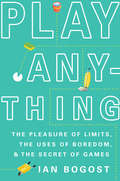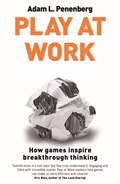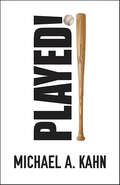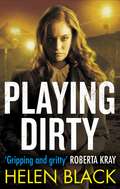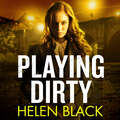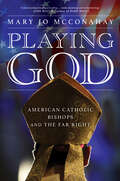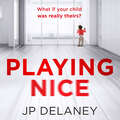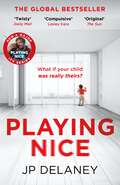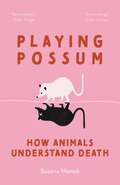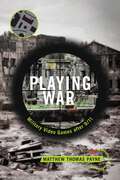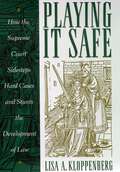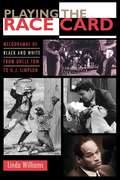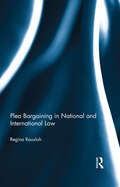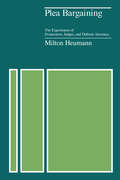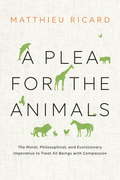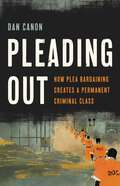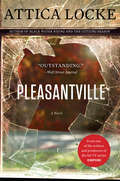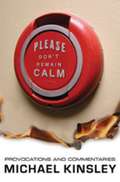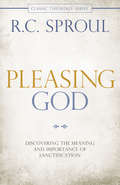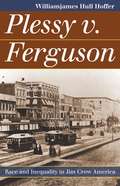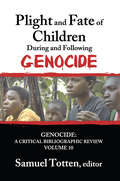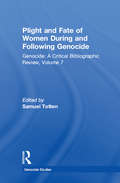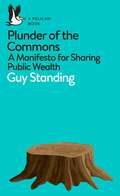- Table View
- List View
Play Anything: The Pleasure of Limits, the Uses of Boredom, and the Secret of Games
by Ian BogostHow filling life with play-whether soccer or lawn mowing, counting sheep or tossing Angry Birds-forges a new path for creativity and joy in our impatient ageLife is boring: filled with meetings and traffic, errands and emails. Nothing we'd ever call fun. But what if we've gotten fun wrong? In Play Anything, visionary game designer and philosopher Ian Bogost shows how we can overcome our daily anxiety; transforming the boring, ordinary world around us into one of endless, playful possibilities.The key to this playful mindset lies in discovering the secret truth of fun and games. Play Anything, reveals that games appeal to us not because they are fun, but because they set limitations. Soccer wouldn't be soccer if it wasn't composed of two teams of eleven players using only their feet, heads, and torsos to get a ball into a goal; Tetris wouldn't be Tetris without falling pieces in characteristic shapes. Such rules seem needless, arbitrary, and difficult. Yet it is the limitations that make games enjoyable, just like it's the hard things in life that give it meaning.Play is what happens when we accept these limitations, narrow our focus, and, consequently, have fun. Which is also how to live a good life. Manipulating a soccer ball into a goal is no different than treating ordinary circumstances- like grocery shopping, lawn mowing, and making PowerPoints-as sources for meaning and joy. We can "play anything" by filling our days with attention and discipline, devotion and love for the world as it really is, beyond our desires and fears.Ranging from Internet culture to moral philosophy, ancient poetry to modern consumerism, Bogost shows us how today's chaotic world can only be tamed-and enjoyed-when we first impose boundaries on ourselves.
Play at Work: How games inspire breakthrough thinking
by Adam L. PenenbergOnce thought to be nothing more than diversions for children and nerds, games have become an integral part of everyday life. Educators are trying to make learning more fun by introducing games into the classroom while cutting-edge managers are doing the same in the workplace. Doctors, scientists, and entrepreneurs are deploying games to help solve some of the world's most pressing problems.But according to Adam Penenberg, it's not the games themselves that improve our lives, but rather smart game design and its impact on the brain that can lead us to become immersed in a task we find enjoyable. The individuals and institutions that have used games to achieve this effect are often rewarded with astounding results.Examples include:* A software developer who changed Microsoft's mind-numbing code review process into a fun, team based game.* Google, which indexed its massive image database with unpaid volunteers by turning the process into a game.* A medical student who created a simple game that helped her overcome distractions and dramatically increased her productivity.Drawing on the latest brain science on attention and engagement plus his own firsthand reporting, Penenberg shows how organizations like Google, Microsoft, hospitals, and the military have used game design in bold new ways.
Played!: A Novel (16pt Large Print Edition)
by Michael A. KahnSpring bursts into bloom-and a whole lot more-as murder-by-arrow rattles Benteen County, Kansas.Nothing ever happens in Benteen County, Kansas. Then, on a perfect spring morning, a member of the reality TV program filming in a local pasture dies with a Cheyenne arrow in his back. Sheriff English's brother, Mad Dog, the county oddball whose Amerind heritage has produced a born-again Cheyenne, is a prime suspect. Murder is a bad way to start the day. Explosive action follows. Notes left for authorities hint at a terrorist assault on the heartland.If the sheriff, known as Englishman, doesn't have enough to worry about, his wife has begun acting strangely. She insists he fly off on a Paris holiday with her before sunset—or else. As Mad Dog swings between suspect and target, he encounters his long-lost high school sweetheart, and a secret that just may explain the unlikely mix of arrows and bombs.It's Murphy's Law squared, as Mad Dog and his pet wolf, Hailey, test a shaman's powers, and Englishman struggles to balance his duties to family and community-enough to drive anyone Plains Crazy.
Playing Dirty (Liberty Chapman #3)
by Helen Black'Gripping and gritty, this book will keep you hooked from the first page to the last' Roberta Kray Liberty Greenwood is back. County lines. Blurred lines. Crossed lines.Things are looking up for Liberty Greenwood. She's brokered a deal with the local rival gangster and it looks like the police have finally stopped investigating her. She even has a plan to steer her family away from their criminal activities.But when a spate of violence on the estates points to a hostile takeover bid from a crew from out of the area, Liberty is forced to take decisive and dangerous action - action which ends up with her doing a stint in prison.Meanwhile, Liberty's partner, ex-copper Sol Connolly is recruited to join an off-the-books team who will stop at nothing to infiltrate the new drugs gang, hellbent on sending kids 'up county.'As Liberty and Sol attack the same problem from different angles, who will give out first? And how many people will have to get hurt as they fight for what they each believe in?'The Leeds setting is every bit as gritty as Kray's East End . . . hard as nails!' Peterborough Telegraph
Playing Dirty (Liberty Chapman #3)
by Helen Black'Gripping and gritty, this book will keep you hooked from the first page to the last' Roberta Kray Liberty Greenwood is back. County lines. Blurred lines. Crossed lines.Things are looking up for Liberty Greenwood. She's brokered a deal with the local rival gangster and it looks like the police have finally stopped investigating her. She even has a plan to steer her family away from their criminal activities.But when a spate of violence on the estates points to a hostile takeover bid from a crew from out of the area, Liberty is forced to take decisive and dangerous action - action which ends up with her doing a stint in prison.Meanwhile, Liberty's partner, ex-copper Sol Connolly is recruited to join an off-the-books team who will stop at nothing to infiltrate the new drugs gang, hellbent on sending kids 'up county.'As Liberty and Sol attack the same problem from different angles, who will give out first? And how many people will have to get hurt as they fight for what they each believe in?'The Leeds setting is every bit as gritty as Kray's East End . . . hard as nails!' Peterborough Telegraph
Playing Dirty (Liberty Chapman Ser.)
by Helen Black'Gripping and gritty, this book will keep you hooked from the first page to the last' Roberta KrayLiberty Greenwood is back.County lines. Blurred lines. Crossed lines.Things are looking up for Liberty Greenwood. She's brokered a deal with the local rival gangster and it looks like the police have finally stopped investigating her. She even has a plan to steer her family away from their criminal activities.But when a spate of violence on the estates points to a hostile takeover bid from a crew from out of the area, Liberty is forced to take decisive and dangerous action - action which ends up with her doing a stint in prison.Meanwhile, Liberty's partner, ex-copper Sol Connolly is recruited to join an off-the-books team who will stop at nothing to infiltrate the new drugs gang, hellbent on sending kids 'up county.'As Liberty and Sol attack the same problem from different angles, who will give out first? And how many people will have to get hurt as they fight for what they each believe in?'The Leeds setting is every bit as gritty as Kray's East End . . . hard as nails!' Peterborough Telegraph
Playing God: American Catholic Bishops and The Far Right
by Mary Jo McConahay&“A fascinating, investigative dive . . . both alarming and enlightening.&” — Jane Mayer, author of Dark Money The definitive account of how a group of American Catholic bishops are using &“dark money&” and allying with ultra-right evangelicals in an attempt to remake America . . . Seasoned Catholic journalist and former war correspondent Mary Jo McConahay tells the story of how the United States Conference of Catholic Bishops have become one of the most formidable and reactionary forces in America — by campaigning to alter democratic institutions under the guise of religious liberty, and allying with major right-wing contributors such as the Kochs. In fact, many of the bishops—two-hundred and twenty-nine men, almost all white and beyond middle age—are such staunch opponents of Pope Francis that some US Catholics fear a schism with Rome. The influence of these bishops can be traced in recent news stories—such was when they maneuvered to deny the Eucharist to pro-abortion politicians like President Biden. With their lay partners, the bishops also help shepherd cases into the Supreme Court that change the law of the land, as with Roe v. Wade. But as McConahay details, that&’s just the tip of the iceberg. In an investigation reminiscent of Jane Mayer&’s Dark Money, she uncovers an ominous and long-term political strategy of attacking secular, liberal democracy by waging war on democratic norms and institutions.
Playing Nice: The addictive and chilling new thriller from the bestselling author of The Girl Before and The Perfect Wife
by JP DelaneyTHE SENSATIONAL NEW PSYCHOLOGICAL THRILLER FROM THE INTERNATIONALLY BESTSELLING AUTHOR OF THE GIRL BEFORE'The kind of book that keeps you up at night' My Weekly'Utterly terrifying and compelling' Stephanie Wrobel'JP Delaney is King of Thrillers and Playing Nice is his best book yet' Fiona Cummins'There is a precision about Delaney's characters that propels his twisty plots into unexpected and utterly convincing scenarios' Daily MailPete Riley answers the door one morning to a parent's worst nightmare. On his doorstep is Miles Lambert, who breaks the devastating news that Pete's two-year-old, Theo, isn't Pete's real son - their babies got mixed up at birth.The two families - Pete, his partner Maddie, and Miles and his wife Lucy - agree that, rather than swap the boys back, they'll try to find a more flexible way to share their children's lives. But a plan to sue the hospital triggers an investigation that unearths disturbing questions about just what happened the day the babies were switched.And when Theo is thrown out of nursery for hitting other children, Maddie and Pete have to ask themselves: how far do they want this arrangement to go? What secrets lie hidden behind the Lamberts' smart front door? How much can they trust the real parents of their child - or even each other?An addictive psychological thriller, perfect for fans of The Silent Patient and Shari Lapena's The Couple Next Door.See what everyone is saying about JP Delaney, the hottest name in psychological thrillers:'DAZZLING' - Lee Child'ADDICTIVE' - Daily Express'DEVASTATING' - Daily Mail'INGENIOUS' - New York Times'COMPULSIVE' - Glamour Magazine'ELEGANT' - Peter James'SEXY' - Mail on Sunday'ENTHRALLING' - Woman and Home'ORIGINAL' - The Times'RIVETING' - Lisa Gardner'CREEPY' - Heat'SATISFYING' - Reader's Digest'SUPERIOR' - The Bookseller'MORE THAN A MATCH FOR PAULA HAWKINS' - Sunday Times(P)2020 Penguin Random House Audio
Playing Nice: the addictive, twisty thriller - now a major TV series
by JP Delaney*Now a major ITV and StudioCanal TV show starring James Norton and Niamh Algar*'A real page-turner' ⭐⭐⭐⭐⭐ reader review'The kind of book that keeps you up at night' My Weekly'Couldn't put it down!' ⭐⭐⭐⭐⭐ reader review'JP Delaney is King of Thrillers and Playing Nice is his best book yet' Fiona Cummins'A rollercoaster of a ride, with plenty of twists and turns' ⭐⭐⭐⭐⭐ reader reviewPete Riley answers the door one morning to a parent's worst nightmare. On his doorstep is Miles Lambert, who breaks the devastating news that Pete's two-year-old, Theo, isn't Pete's real son - their babies got mixed up at birth.The two families agree that, rather than swap the boys back, they'll try to find a more flexible way to share their children's lives. But a plan to sue the hospital triggers an investigation that unearths disturbing questions about just what happened the day the babies were switched.And when Theo is thrown out of nursery for hitting other children, the Rileys have to ask themselves: how far do they want this arrangement to go? What secrets lie hidden behind the Lamberts' smart front door? How much can they trust the real parents of their child - or even each other?See what everyone is saying about JP Delaney, the hottest name in psychological thrillers:'DAZZLING' - Lee Child'ADDICTIVE' - Daily Express'DEVASTATING' - Daily Mail'INGENIOUS' - New York Times'COMPULSIVE' - Glamour Magazine'ELEGANT' - Peter James'SEXY' - Mail on Sunday'ENTHRALLING' - Woman and Home'ORIGINAL' - The Times'RIVETING' - Lisa Gardner'CREEPY' - Heat'SATISFYING' - Reader's Digest'SUPERIOR' - The Bookseller'MORE THAN A MATCH FOR PAULA HAWKINS' - Sunday Times
Playing Possum: How Animals Understand Death
by Susana MonsóHow animals conceive of death and dying—and what it can teach us about our own relationships with mortalityWhen the opossum feels threatened, she becomes paralyzed. Her body temperature plummets, her breathing and heart rates drop to a minimum, and her glands simulate the smell of a putrefying corpse. Playing Possum explores what the opossum and other creatures can teach us about how we and other species understand mortality, and demonstrates that the concept of death, far from being a uniquely human attribute, is widespread in the animal kingdom.With humor and empathy, Susana Monsó tells the stories of ants who attend their own funerals, chimpanzees who clean the teeth of their dead, dogs who snack on their caregivers, crows who avoid the places where they saw a carcass, elephants obsessed with collecting ivory, and whales who carry their dead for weeks. Monsó, one of today&’s leading experts on animal cognition and ethics, shows how there are more ways to conceive of mortality than the human way, and challenges the notion that the only emotional reactions to death worthy of our attention are ones that resemble our own.Blending philosophical insight with new evidence from behavioral science and comparative psychology, Playing Possum dispels the anthropocentric biases that cloud our understanding of the natural world, and reveals that, when it comes to death and dying, we are just another animal.
Playing War: Military Video Games After 9/11
by Matthew Thomas PayneExplores the culture that made military shooter video games popular, and key in understanding the War on TerrorNo video game genre has been more popular or more lucrative in recent years than the “military shooter.” Franchises such as Call of Duty, Battlefield, and those bearing Tom Clancy’s name turn over billions of dollars annually by promising to immerse players in historic and near-future battles, converting the reality of contemporary conflicts into playable, experiences. In the aftermath of 9/11, these games transformed a national crisis into fantastic and profitable adventures, where seemingly powerless spectators became solutions to these virtual Wars on Terror. Playing War provides a cultural framework for understanding the popularity of military-themed video games and their significance in the ongoing War on Terror. Matthew Payne examines post-9/11 shooter-style game design as well as gaming strategies to expose how these practices perpetuate and challenge reigning political beliefs about America’s military prowess and combat policies. Far from offering simplistic escapist pleasures, these post-9/11 shooters draw on a range of nationalist mythologies, positioning the player as the virtual hero at every level. Through close readings of key games, analyses of marketing materials, and participant observations of the war gaming community, Playing War examines an industry mobilizing anxieties about terrorism and invasion to craft immersive titles that transform international strife into interactive fun.
Playing it Safe: How the Supreme Court Sidesteps Hard Cases and Stunts the Development of Law (Critical America #49)
by Lisa KloppenbergIt is one of the unspoken truths of the American judicial system that courts go out of their way to avoid having to decide important and controversial issues. Even the Supreme Court from which the entire nation seeks guidance frequently engages in transparent tactics to avoid difficult, politically sensitive cases. The Court's reliance on avoidance has been inconsistent and at times politically motivated. For example, liberal New Deal Justices, responding to the activism of a conservative Court, promoted deference to Congress and the presidency to protect the Court from political pressure. Likewise, as the Warren Court recognized new constitutional rights, conservative judges and critics praised avoidance as a foundational rule of judicial restraint. And as conservative Justices have constituted the majority on the Court in recent years, many liberals and moderates have urged avoidance, for fear of disagreeable verdicts. By sharing the stories of litigants who struggled unsuccessfully to raise before the Supreme Court constitutional matters of the utmost importance from the 1970s-1990s, Playing it Safe argues that judges who fail to exercise their power in hard cases in effect abdicate their constitutional responsibility when it is needed most, and in so doing betray their commitment to neutrality. Lisa Kloppenberg demonstrates how the Court often avoids socially sensitive cases, such as those involving racial and ethnic discrimination, gender inequalities, abortion restrictions, sexual orientation discrimination, and environmental abuses. In the process, the Court ducks its responsibility to check the more politically responsive branches of government when "majority rule" pushes the boundaries of constitutional law. The Court has not used these malleable doctrines evenhandedly: it has actively shielded states from liability and national oversight, and aggressively expanded standing requirements to limit the role of federal courts.
Playing the Race Card: Melodramas of Black and White from Uncle Tom to O. J. Simpson
by Linda WilliamsThe black man suffering at the hands of whites, the white woman sexually threatened by the black man. Both images have long been burned into the American conscience through popular entertainment, and today they exert a powerful and disturbing influence on Americans' understanding of race. So argues Linda Williams in this boldly inquisitive book, where she probes the bitterly divisive racial sentiments aroused by such recent events as O. J. Simpson's criminal trial. Williams, the author of Hard Core, explores how these images took root, beginning with melodramatic theater, where suffering characters acquire virtue through victimization. The racial sympathies and hostilities that surfaced during the trial of the police in the beating of Rodney King and in the O. J. Simpson murder trial are grounded in the melodramatic forms of Uncle Tom's Cabin and The Birth of a Nation. Williams finds that Stowe's beaten black man and Griffith's endangered white woman appear repeatedly throughout popular entertainment, promoting interracial understanding at one moment, interracial hate at another. The black and white racial melodrama has galvanized emotions and fueled the importance of new media forms, such as serious, "integrated" musicals of stage and film, including The Jazz Singer and Show Boat. It also helped create a major event out of the movie Gone With the Wind, while enabling television to assume new moral purpose with the broadcast of Roots. Williams demonstrates how such developments converged to make the televised race trial a form of national entertainment. When prosecutor Christopher Darden accused Simpson's defense team of "playing the race card," which ultimately trumped his own team's gender card, he feared that the jury's sympathy for a targeted black man would be at the expense of the abused white wife. The jury's verdict, Williams concludes, was determined not so much by facts as by the cultural forces of racial melodrama long in the making. Revealing melodrama to be a key element in American culture, Williams argues that the race images it has promoted are deeply ingrained in our minds and that there can be no honest discussion about race until Americans recognize this predicament.
Plea Bargaining in National and International Law: A Comparative Study
by Regina RauxlohPlea bargaining is one of the most important and most discussed issues in modern criminal procedure law. Based on historical and comparative legal research, the author has analysed the wide-spread use of plea bargaining in different criminal justice systems. The book sets out in-depth studies of consensual case dispositions in the UK, examining how plea bargaining has developed and spread in England and Wales. It also goes on to discusses in detail the problems that this practise poses for the rule of law by avoiding procedural safe-guards. The book draws on empirical research in its examination of the absence of informal settlements in the former GDR, offering a unique insight into criminal procedure in a socialist legal system that has been little studied. Drawing on her research findings, the author goes on to discuss the extent to which plea bargaining should be developed in the International Criminal Court in The Hague, as the question of this practise is set to be one of the seminal debates in the development of international criminal procedures in the new International Criminal Court. Plea Bargaining in National and International Law will be of particular interest to academics and students of international criminal law, criminal procedures and comparative law.
Plea Bargaining: The Experiences of Prosecutors, Judges, and Defense Attorneys
by Milton Heumann"That relatively few criminal cases in this country are resolved by full Perry Mason-style strials is fairly common knowledge. Most cases are settled by a guilty plea after some form of negotiation over the charge or sentence. But why? The standard explanation is case pressure: the enormous volume of criminal cases, to be processed with limited staff, time and resources. . . . But a large body of new empirical research now demands that we re-examine plea negotiation. Milton Heumann's book, Plea Bargaining, strongly and explicitly attacks the case-pressure argument and suggests an alternative explanation for plea bargaining based on the adaptation of attorneys and judges to the local criminal court. The book is a significant and welcome addition to the literature. Heumann's investigation of case pressure and plea negotiation demonstrates solid research and careful analysis."—Michigan Law Review
Plea for the Animals: The Moral, Philosophical, and Evolutionary Imperative to Treat All Beings with Compassion
by Matthieu RicardA powerful and wide-ranging indictment of the treatment of animals by humans--and an eloquent plea for animal rights. Every cow just wants to be happy. Every chicken just wants to be free. Every bear, dog, or mouse experiences sorrow and feels pain as intensely as any of us humans do. In a compelling appeal to reason and human kindness, Matthieu Ricard here takes the arguments from his best-sellers Altruism and Happiness to their logical conclusion: that compassion toward all beings, including our fellow animals, is a moral obligation and the direction toward which any enlightened society must aspire. He chronicles the appalling sufferings of the animals we eat, wear, and use for adornment or "entertainment," and submits every traditional justification for their exploitation to scientific evidence and moral scrutiny. What arises is an unambiguous and powerful ethical imperative for treating all of the animals with whom we share this planet with respect and compassion.
Pleading Out: How Plea Bargaining Creates a Permanent Criminal Class
by Dan CanonA blistering critique of America&’s assembly-line approach to criminal justice and the shameful practice at its core: the plea bargain Most Americans believe that the jury trial is the backbone of our criminal justice system. But in fact, the vast majority of cases never make it to trial: almost all criminal convictions are the result of a plea bargain, a deal made entirely out of the public eye. Law professor and civil rights lawyer Dan Canon argues that plea bargaining may swiftly dispose of cases, but it also fuels an unjust system. This practice produces a massive underclass of people who are restricted from voting, working, and otherwise participating in society. And while innocent people plead guilty to crimes they did not commit in exchange for lesser sentences, the truly guilty can get away with murder. With heart-wrenching stories, fierce urgency, and an insider&’s perspective, Pleading Out exposes the ugly truth about what&’s wrong with America&’s criminal justice system today—and offers a prescription for meaningful change.
Pleasantville
by Attica LockeFrom Attica Locke, a writer and producer of FOX's Empire, this sophisticated thriller sees lawyer Jay Porter--hero of her bestseller Black Water Rising--return to fight one last case, only to become embroiled in a dangerous game of shadowy politics and a witness to how far those in power are willing to go to win. Fifteen years after his career-defining case against Cole Oil, Jay Porter is broke and tired. That victory might have won the environmental lawyer fame, but thanks to a string of appeals, he hasn't seen a dime. His latest case--representing Pleasantville in the wake of a chemical fire--is dragging on, shaking his confidence and raising doubts about him within this upwardly mobile black community on Houston's north side. Though Jay still believes in doing what's right, he is done fighting other people's battles. Once he has his piece of the settlement, the single father is going to devote himself to what matters most--his children. His plans are abruptly derailed when a female campaign volunteer vanishes on the night of Houston's mayoral election, throwing an already contentious campaign into chaos. The accused is none other than the nephew and campaign manager of one of the leading candidates--a scion of a prominent Houston family headed by the formidable Sam Hathorne. Despite all the signs suggesting that his client is guilty--and his own misgivings--Jay can't refuse when a man as wealthy and connected as Sam asks him to head up the defense. Not if he wants that new life with his kids. But he has to win. Plunging into a shadowy world of ambitious enemies and treacherous allies armed with money, lies, and secrets, Jay reluctantly takes on his first murder trial--a case that will put him and his client, and an entire political process, on trial.
Please Don't Remain Calm: Provocations and Commentaries
by Michael KinsleyThis volume collects editorial columns penned by Slate founder and center-left political pundit Michael Kinsley between 1995 and 2007. Kinsley addresses a diverse range of topics, including the Wen Ho Lee case, Bush v. Gore, the definition of terrorism, the Martha Stewart insider trading case, the United Nations and the US war on Iraq, the Valerie Plame scandal, nostalgia for the late Ronald Reagan, and Supreme Court nominations, to name just a few. Annotation ©2008 Book News, Inc., Portland, OR (booknews.com)
Please Don't Wish Me a Merry Christmas: A Critical History of the Separation of Church and State (Critical America #30)
by Stephen M. Feldman.Whether in the form of Christmas trees in town squares or prayer in school, fierce disputes over the separation of church and state have long bedeviled this country. Both decried and celebrated, this principle is considered by many, for right or wrong, a defining aspect of American national identity. Nearly all discussions regarding the role of religion in American life build on two dominant assumptions: first, the separation of church and state is a constitutional principle that promotes democracy and equally protects the religious freedom of all Americans, especially religious outgroups; and second, this principle emerges as a uniquely American contribution to political theory. In Please Don't Wish Me a Merry Christmas, Stephen M. Feldman challenges both these assumptions. He argues that the separation of church and state primarily manifests and reinforces Christian domination in American society. Furthermore, Feldman reveals that the separation of church and state did not first arise in the United States. Rather, it has slowly evolved as a political and religious development through western history, beginning with the initial appearance of Christianity as it contentiously separated from Judaism.In tracing the historical roots of the separation of church and state within the Western world, Feldman begins with the Roman Empire and names Augustine as the first political theorist to suggest the idea. Feldman next examines how the roles of church and state variously merged and divided throughout history, during the Crusades, the Italian Renaissance, the Protestant Reformation, the British Civil War and Restoration, the early North American colonies, nineteenth-century America, and up to the present day. In challenging the dominant story of the separation of church and state, Feldman interprets the development of Christian social power vis--vis the state and religious minorities, particularly the prototypical religious outgroup, Jews.
Pleasing God
by R. C. SproulDr. R.C. Sproul is one of the most vital and renowned theologians of our time. For over 40 years Dr. Sproul has encouraged, educated, and enlightened millions through his books, teaching, and ministry. How can imperfect people hope to please a perfect God? The answer is both simple and challenging: sanctification. Pleasing God takes an in-depth look at sanctification and its essential role in the life of every believer. Filled with Biblical insights, this release guides both new and seasoned Christians through God's path for transforming His people.
Plessy V. Ferguson: Race And Inequality In Jim Crow America
by WilliamJames Hull HofferSix decades before Rosa Parks boarded her fateful bus, another traveler in the Deep South tried to strike a blow against racial discrimination--but ultimately fell short of that goal, leading to the Supreme Court's landmark 1896 decision in Plessy v. Ferguson. Now Williamjames Hull Hoffer vividly details the origins, litigation, opinions, and aftermath of this notorious case. In response to the passage of the Louisiana Separate Car Act of 1890, which prescribed "equal but separate accommodations" on public transportation, a group called the Committee of Citizens decided to challenge its constitutionality. At a pre-selected time and place, Homer Plessy, on behalf of the committee, boarded a train car set aside for whites, announced his non-white racial identity, and was immediately arrested. The legal deliberations that followed eventually led to the Court's 7-1 decision in Plessy, which upheld both the Louisiana statute and the state's police powers. It also helped create a Jim Crow system that would last deep into the twentieth century, until Brown v. Board of Education in 1954 and other cases helped overturn it. Hoffer's readable study synthesizes past work on this landmark case, while also shedding new light on its proceedings and often-neglected historical contexts. From the streets of New Orleans' Faubourg Trem district to the justices' chambers at the Supreme Court, he breathes new life into the opposing forces, dissecting their arguments to clarify one of the most important, controversial, and socially revealing cases in American law. He particularly focuses on Justice Henry Billings Brown's ruling that the statute's "equal, but separate" condition was a sufficient constitutional standard for equality, and on Justice John Marshall Harlan's classic dissent, in which he stated, "Our Constitution is color-blind, and neither knows nor tolerates classes among its citizens. " Hoffer's compelling reconstruction illuminates the controversies and impact of Plessy v. Ferguson for a new generation of students and other interested readers. It also pays tribute to a group of little known heroes from the Deep South who failed to hold back the tide of racial segregation but nevertheless laid the groundwork for a less divided America.
Plight and Fate of Children During and Following Genocide (Genocide: A Critical Bibliographic Review Ser.)
by Samuel TottenPlight and Fate of Children During and Following Genocide examines why and how children were mistreated during genocides in the twentieth and twenty-first centuries. Among the cases examined are the Australian Aboriginals, the Armenian genocide, the Holocaust, the Mayans in Guatemala, the 1994 Rwanda genocide, and the genocide in Darfur. Two additional chapters examine the issues of sexual and gender-based violence against children and the phenomenon of child soldiers.Following an introduction by Samuel Totten, the essays include: "Australia's Aboriginal Children"; "Hell is for Children"; "Children: The Most Vulnerable Victims of the Armenian Genocide"; "Children and the Holocaust"; "The Fate of Mentally and Physically Disabled Children in Nazi Germany"; "The Plight and Fate of Children vis-a-vis the Guatemalan Genocide"; "The Plight of Children During and Following the 1994 Rwandan Genocide"; "Darfur Genocide"; "Sexual and Gender-Based Violence against Children during Genocide"; and, "Child Soldiers." Contributors include: Colin Tatz, Henry C. Theriault, Asya Darbinyan, Rubina Peroomian, Jeffrey Blutinger, Amanda Grzyb, Elisa von Joeden-Forgey, Sara Demir, Hannibal Travis, and Samuel Totten.The editor and several of the contributors have personally investigated and witnessed the aftermath of genocidal campaigns.
Plight and Fate of Women During and Following Genocide: Volume 7, Genocide - A Critical Bibliographic Review (Genocide Studies)
by Samuel TottenThe plight and fate of female victims during the course of genocide is radically and profoundly different from their male counterparts. Like males, female victims suffer demonization, ostracism, discrimination, and deprivation of their basic human rights. They are often rounded up, deported, and killed. But, unlike most men, women are subjected to rape, gang rape, and mass rape. Such assaults and degradation can, and often do, result in horrible injuries to their reproductive systems and unwanted pregnancies. This volume takes one stride towards assessing these grievances, and argues against policies calculated to continue such indifference to great human suffering.The horror and pain suffered by females does not end with the act of rape. There is always the fear, and reality, of being infected with HIV/AIDS. Concomitantly, there is the possibility of becoming pregnant.Then, there is the birth of the babies. For some, the very sight of the babies and children reminds mothers of the horrific violations they suffered. When mothers harbor deep-seated hatred or distain for such children, it results in more misery. The hatred may be so great that children born of rape leave home early in order to fend for themselves on the street.This seventh volume in the Genocide series will provoke debate, discussion, reflection and, ultimately, action. The issues presented include ongoing mass rape of girls and women during periods of war and genocide, ostracism of female victims, terrible psychological and physical wounds, the plight of offspring resulting from rapes, and the critical need for medical and psychological services.
Plunder of the Commons: A Manifesto for Sharing Public Wealth (Pelican Books)
by Guy Standing'One of the most important books I've read in years' Brian EnoWe are losing the commons. Austerity and neoliberal policies have depleted our shared wealth; our national utilities have been sold off to foreign conglomerates, social housing is almost non-existent, our parks are cordoned off for private events and our national art galleries are sponsored by banks and oil companies. This plunder deprives us all of our common rights, recognized as far back as the Magna Carta and the Charter of the Forest of 1217, to share fairly and equitably in our public wealth.Guy Standing leads us through a new appraisal of the commons, stemming from the medieval concept of common land reserved in ancient law from marauding barons, to his modern reappraisal of the resources we all hold in common - a brilliant new synthesis that crystallises quite how much public wealth has been redirected to the 1% in recent decades through the state-approved exploitation of everything from our land to our state housing, health and benefit systems, to our justice system, schools, newspapers and even the air we breathe. Plunder of the Commons proposes a charter for a new form of commoning, of remembering, guarding and sharing that which belongs to us all, to slash inequality and soothe our current political instability.
